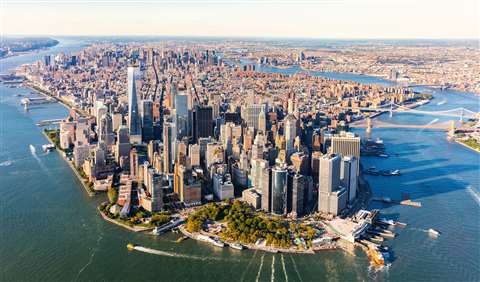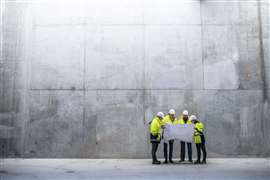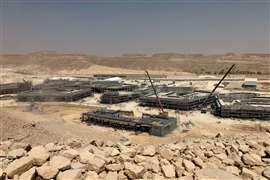World’s most and least expensive cities to build in revealed
19 April 2023
 New York is one of the top ten most expensive cities in the world in which to build
New York is one of the top ten most expensive cities in the world in which to build
There is a new most expensive city in the world in which to build, according to the latest Arcadis 2023 International Construction Costs (ICC) report – Geneva, Switzerland.
According to the study of comparative construction costs across 100 global cities, the UK capital city of London was overtaken by Geneva, with New York coming third and San Francisco fourth.
A number of factors impacted costs including high levels of inflation, which continued to affect most cities in the report. As a result, many of the top ten most expensive cities remained unchanged from last year, including hotspots such as Munich, Copenhagen, and Zurich.
Five of the top ten were also cities with dollar-denominated or dollar-pegged currencies, including Hong Kong, while Boston and Philadelphia in the US were new entrants thanks to a combination of dollar appreciation and the ongoing impact of local inflation.
According to the report, entitled New Horizons, European market costs were particularly impacted by the invasion of Ukraine over 2022, over and above the worldwide increase seen in energy costs, with the resulting disruption to local manufacturing supply chains and regional-specific energy markets adding 5-6% to the region’s inflation.
The 2023 Arcadis ICC Index covers 100 of the world’s large cities across six continents. The cost comparison was developed covering 20 different building types, including residential, commercial, and public sector developments, and is based on a survey of construction costs, a review of market conditions and the professional judgement of Arcadis’ global team of experts.
The report highlighted that, with the need to mitigate against climate change and more stringent carbon reduction targets coming to the fore, sustainable buildings in prime locations were increasingly in high demand. This is resulting in the application of a ‘green premium’ when it comes to how the most sustainable assets are being valued.
What are the world’s most expensive cities to build in?
1. Geneva
2. London
3. New York
4. San Francisco
5. Munich
6. Zurich
7. Copenhagen
8. Hong Kong
9. Boston
10. Philadelphia
Arcadis’ ICC index uses Amsterdam as a baseline location. Construction prices in the city rose by only 1-2% even though the sector faced multiple headwinds in 2023, including an economic slowdown and delays. Arcadis said there were signs that contractors were discounting bids to secure work, resulting in Amsterdam falling 11 places from 51st in the index to 62nd.
The consultant warned that other markets could soon see similar cost absorption as demand softens.
What are the world’s least expensive cities to build in? (Least expensive first)
1. Bengaluru,India
2. Kuala Lumpur, Malaysia
3. Delhi, India
4. Mumbai, India
5. Ho Chi Minh City, Vietnam
6. Johannesburg, South Africa
7. Chengdu, China
8. Nairobi, Kenya
9. Bangkok, Thailand
10. Wuhan, China
Inflation outlook
Fewer than 10 cities recorded zero or negative inflation, all of which were located in south east and east Asia.
Cities in New Zealand and Australia, previously affected by extended Covid-19 lockdowns experienced a V-shaped recovery that saw prices rise sharply. China, where lockdowns only ended in late 2022, is not likely to see a price bounceback until this year.
Arcadis predicted that construction inflation in China would hit 3% in 2023.
In the USA, costs could rise further despite a predicted contraction in the construction market of 3.5%-5% in 2023. That’s because a slowdown in residential construction will be countered by demand for infrastructure driven by US$1.5 trillion in infrastructure stimulus. That could trigger risks of delay and inflation amid a shortage of up to half a million workers.
In the UK, construction inflation peaked at 10-12% in 2022 but a slowdown in the building sector means that inflation for buildings is expected to fall to 2-3% in 2023, while infrastructure inflation will run higher at 6-7%.
In Ireland, construction products increased in cost by 16.2% in 2022. GDP in the country grew by 12% over the same period, and is forecast to be 4.9% in 2023, well above the EU average. Material prices are likely to remain “challenging” in 2023 but input cost inflation eased to a two-year low in January 2023.
In Germany, input costs increased at the slowest rate in January 2023 since November 2020. But that was after seeing some of the highest construction inflation in Europe in 2022, which has led to project cancellations. One study by the Ifo Institute in Munich found that 16.7% of construction companies suffered cancellations in November 2022, up from a typical rate of only 1-2%.
STAY CONNECTED


Receive the information you need when you need it through our world-leading magazines, newsletters and daily briefings.
CONNECT WITH THE TEAM










